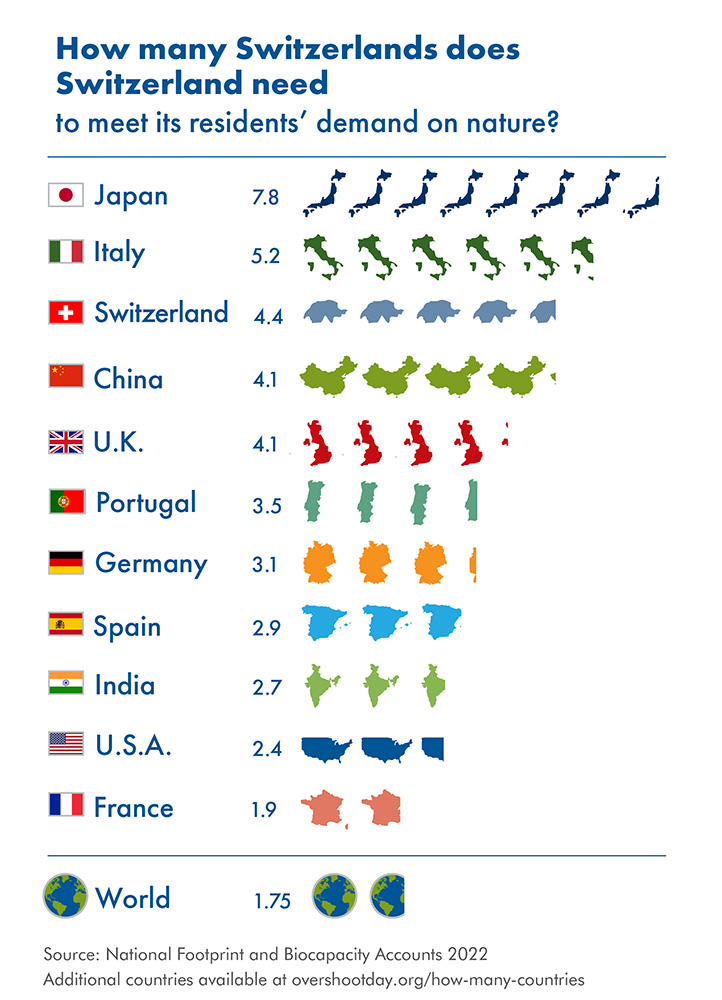Switzerland’s ecological resource security ranks 32nd out of 35 European countries according to the National Footprint and Biocapacity Accounts
By March 25, Swiss residents have consumed what Swiss ecosystems can renew in the entire year. Switzerland’s high dependence on ecological capacity from abroad in a context of persistent global ecological overshoot means Switzerland’s risk exposure is growing.
GENEVA, SWITZERLAND – March 22, 2023 – By Saturday, March 25th, Switzerland has already spent its own annual ecological resource budget according to data from the National Footprint and Biocapacity Accounts (produced by York University in Toronto and governed by FoDaFo). Comparing Switzerland’s biocapacity to its Ecological Footprint indicates the country’s resource security. In the data table for 35 European countries with more than a million residents, Switzerland’s resource insecurity is only trailed by Italy, the Netherlands, and Belgium. In contrast, Finland, Sweden, and Latvia, endowed with biocapacity that exceeds their Footprints, are the three most resource-secure countries in Europe.
The risk of resource insecurity has been made more prominent by the war in Ukraine and the pandemic-induced supply interruptions in recent years. Disruptions in supply chains can now easily undermine economic and social stability. Staying underprepared for the predictable future of climate change and resource constraints can easily fuel economic stagflation. This is a combination of inflation and stagnation. Inflation is driven by increased costs for input resources. Stagnation emerges as economic opportunities decline due to the erosion of value in assets that are not fit for the future. Given Switzerland’s resource security ranking, what is holding the country back from protecting its own future?
Taking a closer look at Swiss residents’ demands:
- Switzerland’s Ecological Footprint is more than 4 times the size of its biocapacity.
- The carbon Footprint of Switzerland is 61% of its total Footprint. It is still a dominant input even though the Paris Agreement would imply a full phase out of carbon emissions well before 2050.
- Solutions for a full energy transition, one compatible with the Paris climate goals, are known, but implementation is excessively slow.
- Food makes up 20% of Switzerland’s total Footprint with less than half of it produced by Swiss biocapacity.
- Strategies to reduce food waste, employ regenerative farming practices, and shift to healthier and environmentally friendlier diets are known yet lack implementation.
“A robust food system, for the world and for Switzerland, requires less degrading ways to produce food, a shift to less resource-intensive food, a reduction of feed from croplands where food for humans could be produced directly, and avoiding waste. How to transform the food system is less clear, and even less is implemented,” said Dr. Anita Frehner from FiBL.
“The economy has a vested interest in more resource efficiency. The good news is that there are ever more opportunities with circular economy and climate-friendly business models. To ensure that we achieve the necessary change in time, swisscleantech is campaigning for the needed political conditions,” comments Franziska Barmettler, member of the swisscleantech board.
This growing mismatch between human demand and the planet’s ecological resources invites the question: what is becoming more valuable in the era of persistent overshoot? “We believe it is things that, as we have more of them, further reduce global overshoot. Power of Possibility provides examples of such options. These are the most promising opportunities,” says Dr. Mathis Wackernagel from Global Footprint Network.
Yet, there is great opportunity to build capacity that would allow us all to thrive in a resource-constrained world. “For instance, in the agro-food space, we observe growth rates of over 10% per year among companies which advance fresh ways of increasing nutrition and health, while reducing overshoot. They are promising value propositions,” says Dr. Lucas Grob from Swiss Food Research, an agro-food innovation network.
“It’s not that complicated,” adds Lauren Wildbolz from Soil to Soul. “Eat food. Mostly plants. Not too much.”
Media contact:
Corinne Stämpfli
corinne.staempfli@swissfoodresearch.ch
m : +41 76 579 4842
Debora Barioni (English, Italian)
debora.barioni@footprintnetwork.org
m : +39 347 1234586
More Resources:
- Blog: Switzerland ranking 32nd out of 35 (English and Deutsch).
- More on Swiss Deficit Day
- Swiss key facts at www.footprintnetwork.org/swissfacts


 Choose file size to view/download:
Choose file size to view/download: